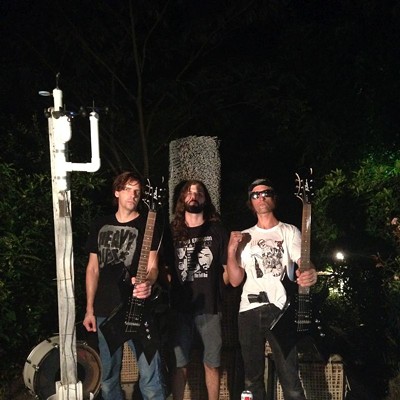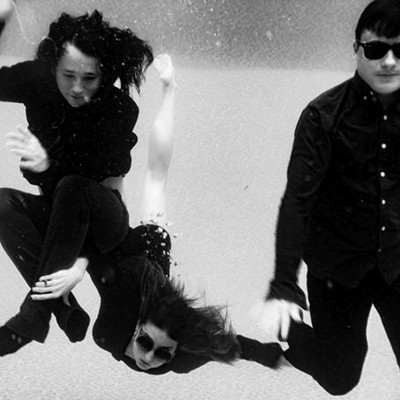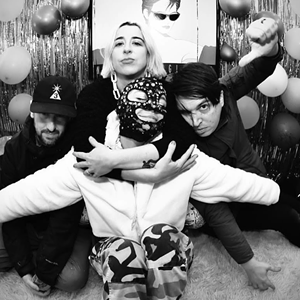OVER THE PAST FOUR YEARS, Savannah’s Baroness has steadily risen from an extremely promising, ultra-underground metal band with strong prog-rock influences to become one of the most buzzworthy such groups on the world scene.
A unique and thought-provoking outfit that seamlessly merges elements of modern metal, post-hardcore, vintage punk and even the syncopated, harmony guitar leads of classic rock, their anthemic, unpredictable and extremely technical brand of extreme rock music is earning them a rabid following far beyond our shores.
On the eve of an impressive double-bill tour of Europe with fellow Savannah-based metal heroes Kylesa, Baroness frontman and guitarist John Baizley (who also creates the psychedelic art which graces their record covers, posters and T-shirts) spoke to us about his group’s new record, The Red Album, and why they love to play across the pond.
How much rehearsal has gone into preparing for this tour?
John Baizley: For this European tour, it’s actually kind of a funny story. Our drummer lives in Brooklyn, and almost every other month we’re out on the road for a while, doing some sort of tour. He’ll typically come down and do at most one or two practices with us before we leave. The rest of us have a fairly regimented rehearsal routine of two or three days a week. Our second guitar player lives in Virginia, but he makes it down here more often. It’s definitely a weird situation. Our drummer is a graphic designer and he lived in Savannah for a while, but it didn’t really suit his profession as much as New York City.
I’m amazed that you only rehearse with your drummer sporadically, as the band is incredibly tight live, and frankly, a lot of the drum parts are complex and more than a bit tricky.
John Baizley: It’s really always been that way. When we first started, he lived in Virginia. Out of the past five years, he’s only spent about one year in Savannah with us. There’s always a lot of travelling involved in making this work. We’ve known each other for so long that these practices don’t really have much to do with defining how well our tours sound.
Is the new CD living up to expectations?
John Baizley: I know it’s definitely lived up to the expectations the band had for it. That said, we just wanted something we were proud of that was engaging for us to write and record, and which gave us material to be interested in while playing live. We weren’t looking at numbers or dates or anything like that. The label has been pleased with it as well. I don’t know —or care to know— how many we’ve sold. The press has been really good and the live shows have been good as well. Everyone connected with the album is proud of it, so on those terms it’s doing very well.
Is being on a larger label everything you thought it would be?
John Baizley: Of course, before we made that decision we did plenty of background research. We talked to plenty of people at the label, both artists on the roster and those who had left the label as well. We talked to other labels, too. Essentially, all the horror stories one hears can be true in some form or another. I think all that stuff boils down to a level of preparedness. The dramatic, complainable stuff we’ve tried to keep to a minimum! Other than that, honestly, the primary reason we went with a bigger label was just for the distribution it gave us.
I don’t particularly put much stock into using larger budgets for records, because that only puts you farther into debt. It’s just nice to know that our records are more available nationally and internationally. I know that people have much more access to our music than before. Up until we signed with Relapse, people abroad who had our albums either had to have bought them from us at our own shows, or have dug fairly deep into the mail-order underground to find them. Now I know our albums are actually in stores, and that’s been a real plus for us.
How has signing this deal changed the way the band is viewed by the media and the public — if at all?
John Baizley: That’s a difficult question for me to answer honestly, because that’s a bit outside of my perspective. We did anticipate some backlash from our pre-existing fanbase, and I think we were all surprised that it came and went on a much smaller scale than we had feared. On the journalistic side of things, we get a lot more phone calls now. All the reviews I have seen so far have gone from fairly positive to really good. So, we’re being received well, but this record is definitely being listened to through a different set of ears and with an increased level of scrutiny.
Did you anticipate backlash because some folks never want to see a DIY band jump to a larger label, or because Relapse has some sort of a bad rep for blowing up bands and then abandoning them?
John Baizley:Relapse, to my knowledge, doesn’t have that rep. There is a sector of the underground that wants in some perverse way to believe that hardworking bands are ultimately going to sell out. They think that we’re not making a decision to try and reach more ears, but that we’re doing it to make more money — which couldn’t be farther from the truth! (laughs) That sort of mentality breeds mistrust of the mid-level record labels, such as Relapse.
That’s one thing that’s not a positive aspect of the DIY underground, but I’ve come to understand that as a part of its wellspring of vitality. By that I means that this scrutiny keeps everybody on their toes and helps to actually keep the underground alive. I think the whole outlook is screwed. There is some credence to it, but at the end of the day, there will be some people thinking that we’re making decisions for reasons other than our own. I’ve chosen to take the higher path, so I don’t like to get into the details of why we’ve made any such decisions. That’s where you get into all the arguing and bickering.
Was this tour conceived as a double bill?
John Baizley: It was always conceived from the get-go as a double bill. It took probably longer than anyone thought for us to actually do it, but it’s been an idea between the two camps for a couple of years. This seemed like a good time for both of us to do it. It wasn’t the case of one band inviting the other.
Who is technically considered the headliner, or is this a co-headlining tour?
John Baizley: Well, I consider it a co-headlining tour, but I think that some of the local promoters in Europe may have a different opinion. Because truth be told, there are certain cities in Europe where Kylesa are a much bigger name than we are. But, when we conceived of the tour, the idea was to play to everyone’s strengths. That way we can have access to some of the cities where Kylesa had already broken in, and they could do the same with towns in which we were known.
Will the bands alternate who closes the show, or does that sort of thing even matter in the metal world at the level you guys are at?
John Baizley: I don’t wanna say that nobody places that kind of importance on it, but to a large extent, that decision is left up to the regional and local promoters, so there won’t be any tension or arguments between any of us! (laughs) It’s been my experience with these European tours that the fact that there are two American bands on the same bill will bring a lot of people out. Plus, most of the European shows are over by 11 pm, so no one’s gonna leave early and skip the last act. There’s even less competition in that respect than in Savannah. I think that when we’re over there, this will be viewed as an engagement to see two U.S. bands in one night.
You’ve toured Europe before. How is it different from your domestic tours?
John Baizley: First and foremost —and this is really the appeal, outside of the travel itself— the tours on any level, from high profile to low profile, are so much more organized in Europe. The structure and regimentation of the tour is so much easier to deal with from a band’s perspective, that it’s really a no-brainer to get over to Europe as quickly as possible. Sometimes the differences between here and there are glaring. The standard M.O. of someone who’s booking shows in Europe is that when the show is considered confirmed, this means your food is taken care of. They either cook for you, or have food accessible. They make sure all the incidental things you need, like towels or water are there. Plus, when they say a show starts at 8 pm, everybody is there and ready to go at 8 pm! If they say it starts at 8:30 pm, everybody is there and ready to go at 8:30 pm. On top of that, you are guaranteed a place to sleep every night. Whether that is a hotel or someone’s house, but all the guesswork that comes up in the states is a complete non-issue. That makes all the difference. Plus, I would say the fanbase and the listening public over there is so much more well informed on what they’re listening to and what’s going on. It all adds up to you feeling much more respected, and the whole thing feels more worth it. That’s almost in a non-financial sense. It’s really an invigorating experience.
I’ve always wanted to play Europe, but the musical projects I’ve been involved with never seemed able to take the time or the risk. To hear you talk about this really makes me want to re-investigate that option.
John Baizley: Yeah, that’s really a stumbling block for a lot of people. The first step in even trying to get over there is a rough one, but once you gain access to the people who are moving and shaking over there —and this goes from the smallest DIY shows to the biggest academy or theater gigs— there’s such a hierarchy of organization. The way people handle things just makes sense.
If you asked a band how they would like a show to be set up, that’s pretty much how they set it up over there. Now, from my experience, that is not how it usually works in this country. I think a lot of this has to do with the pay structure being more respectable in Europe. Sound guys and promoters both get paid what they’re worth. There’s not one person who’s getting paid way too much and someone else getting way too little. Including the bands. And it doesn’t run the audiences out of the shows. It’s such a much better experience all around. We jump at any opportunity to go over there. I recommend that anyone who can go, does, because it is literally a whole new world of touring.
Do you ship your own equipment, or rent it once you arrive?
John Baizley: We rent as much gear as we can over there.
Tell me a bit about the friendship between your band and Kylesa. I assume this double bill will be nice since it’s like taking a little chunk of Savannah abroad...
John Baizley: I think that’s really exciting to a lot of European people, where it might not seem that exotic to us for obvious reasons. The response that I have received from a lot of journalists is that it’s so special because Savannah is so small and almost unheard of. It is like taking this little city on tour for a few weeks. That’s not the reason we put the tour together, though. The simple fact is that we’ve been friends with all the members of that band since before we started playing. There was one Kylesa show in particular that really reinvigorated my interest in DIY and underground music. I think since then both bands have grown up a lot. I’ve done design work for them, and Philip (Cope, Kylesa member) has done production on everything we’ve ever recorded. So, there’s a thread of cooperation that runs through both bands. This is a perfect opportunity for all of us.
Does Baroness get much airplay on broadcast radio in Europe, or is the band mostly heard on internet radio?
John Baizley: That’s a good question, and one I am entirely unqualified to answer. I know that here in the U.S., we do get on college radio’s metal charts — or whatever they call them now. At least I’ve seen in print that we hit some number on a local college radio show somewhere, so that does happen. I think much more common is that there are a number of our songs which have been played on Sirius Radio. I want to assume the same is true in Europe, but I’d like to think it’s a little easier for us to be heard on European radio. Regardless, the feedback we get is that things are moving along for us at a faster rate in Europe than here. There seems to be a real tangible momentum for us over there which I am looking forward to witnessing firsthand, because so far, I’ve only heard of it.
Currently, what are some of the better markets for your band outside of the USA?
John Baizley: Right off the top of my head, we’ve always done really well in the U.K., contrary to the experiences of a lot of other similar bands. We do great over there. There seems to be something musical with us that is in touch with British sensibilities. I say that because I know a lot of bands have a hard time breaking in over there, but we’ve been welcomed with open arms, and this will be our fourth or fifth time in the U.K.
We appear to have a rather large following in Indonesia. That comes solely from one or two people who got in touch with us early on after our first EP came out. They found us and asked us if we would allow them to burn our CD and slap a cheaply xeroxed cover on it and sell it at other band’s shows for like a dollar. They said a lot of folks over there just can’t afford a $10 CD. We felt we should allow them to do it. I mean, if we didn’t do that it would just complicate things, and we’d never gain any ground there. There’s a few internet barometers that tell me we actually have a decent following there even though we’ve never been and have no real contact with that community. It’s exciting to know that there are finally a few offers coming in from that part of the world.
There are pockets throughout Europe, such as certain parts of Germany and Scandinavia, where we do surprisingly well. Just like in the USA — it’s here, there and everywhere. The way that pans out is that a year and a half ago when we toured for two months in Europe, there were some shows where a packed house meant 100 to 150 people. That felt good and seemed justifiable. Then we sold out a place in London called the Underworld that was like a 600 or 700 capacity. Now, at that point, it was definitely an anomaly, but still, I think that show cost 10 pounds to get in, which is not horribly expensive, but it’s twice as much as five pounds!
The second show we ever played outside of the U.S. was in London, about three or four years ago, and there were 350 people there. Now mind you, every time to date that we’ve been to Europe, we’ve never had a full-length record out. At most, we’ve only had EPs to sell. That’s why this is an exciting time for us to go over there. We’ve never had a full-length or the backing of an established label. That’s another cool thing. There is a crowd out there who will on principle come out and see a band who’s on this label. So, I expect head counts to raise a bit. We’re also playing a show with several other indie bands at an indoor venue that holds 4,000 to 6,000 people.
How concerned is Baroness as a band about the threat of illegal downloading and file sharing? How much does that impact your record sales?
John Baizley: You know, I raised that question a number of times, and I used to be a lot more concerned about it. I think a lot of people and labels are trying to deal with it realistically — meaning it is beyond the point of worry or concern. It has become the reality. It has become the status quo.
First off, I think the whole thing going down is that we don’t really make money off CDs. As a touring band, merchandise is the name of the game. We simply don’t survive off our studio recordings. It will definitely mean we’ll have smaller royalty checks, but then again, we’ve never really seen royalty checks so far anyway!
I think this impacts the bigger labels on a much different scale. I think the independent labels will fare much better than the big guys. In fact, I’m positive of it, and that’s based on things I’ve read and conversations I have had that seem to relate directly to the idea that the smaller the label, the less worried their guys are. That’s a discussion which needs to take place, but I don’t think it’ll really make a big difference for us. Because we’ve been growing since we started, and we’ve come up as the download and file sharing thing has existed. It’s unfortunately been a part of our day to day existence as musicians.
Thanks for taking so much time to speak with me about all of this.
John Baizley: I’m glad to. This is a good conversation. Actually, it’s been better than a lot of the off-the-wall conversations I’ve been having.
I bet the increased publicity surrounding the new LP has made for a lot more random press interviews.
John Baizley: Definitely.
And I bet a lot of them have been really grueling (laughs).
John Baizley: With the exception of maybe one or two people, it’s been almost the exact same conversation over and over and over. And it hardly ever shines any light on our band or our music. There’s a lot of shallow questions. Plus, there’s a lot of preconceptions with the genre we’re in, and truth is that we just don’t fit into those preconceptions. Even a lot of the bigger press guys don’t seem to even know what we’ve done when they call us up! It makes for conversations that are 100% in opposition to what we feel we’re all about.
In what ways?
John Baizley: Well, for one thing, it bugs me that people want us to be a ‘southern band’ in a less than desirable way. So they try and focus on that. I’ve noticed a lot of magazines and newspapers focus on that and will print things out of context that seem designed to make me sound more ignorant. I mean, if I talk to someone for 20 minutes and use some kind of foul language at one brief point, that’s all they’ll print.
Well, what they’re trying to do is fit you into some narrative, because they believe that makes for a more compelling story. They’re attempting to position you as either a southern band trying to break out of that mold —like you’re embarrassed of where you come from— or one who is proud of their heritage and trying to spread the southern way of life.
John Baizley: That’s exactly what happens. And the fact that such an approach makes me sort of indignant and ‘in their face’ means that it becomes tough to get anything of substance out of me at that point. Honestly, something I’ve made a real habit out of is declining to even dignify those questions by giving any sort of answer. That drives people crazy! (laughs) Then, you’re suddenly in the position of being at the mercy of whether or not the person on the other end of the line understands where you’re coming from — because they could take their own thing out on you in print. It’s not that I dread that, but I do realize it can be the result.






























